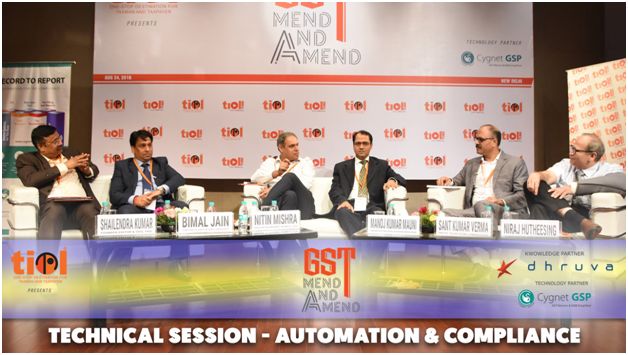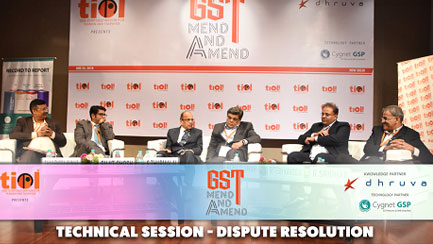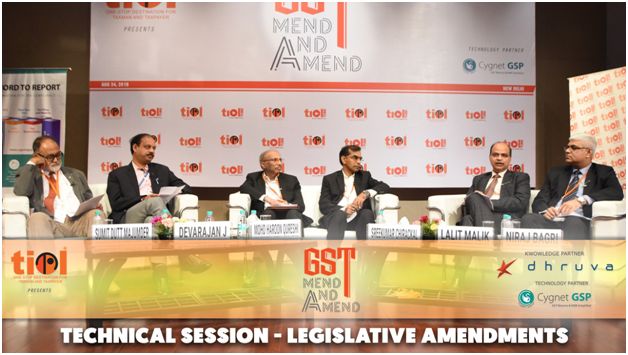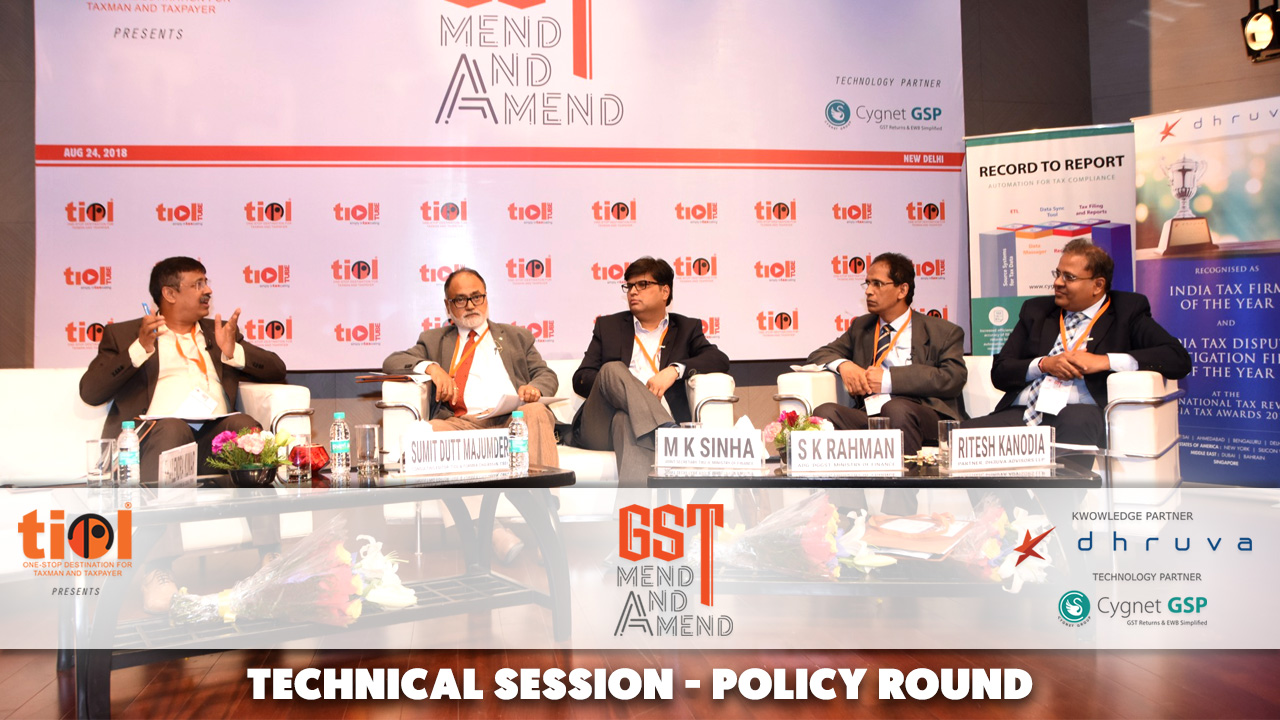|
SERVICE TAX
2018-TIOL-2769-CESTAT-MUM + Case Story
SKF India Ltd Vs CCE
ST - Service received from Associated Enterprises located outside India - Service Tax paid on reverse charge and on the value of services as soon as it is credited in books of accounts - variation in the value posted in Appellant’s books of accounts and actual amounts remitted to the service providers - Revenue view is that differential tax should be paid on account of exchange rate variation - appeal to CESTAT.
Held: Clarification D.O.F.No. 334/1/2008 dated 29.02.2008 clearly lays down that in case of the Associated Enterprises, service tax is to be determined and paid immediately when the documents in relation to supply of service, i.e. invoice etc., is entered into the books of account irrespective of the date when payment is made against the said invoice - service tax in all such cases is required to be determined, immediately when the transaction between the Associated Enterprises get reflected in the books of account and not when the payment is made - Tax arbitrage cannot be a sound principle of taxation in any tax system - Determination of taxable value and tax incidence has been totally delinked from the date of payment of tax - Appeals allowed: CESTAT [para 10.1, 10.2, 10.3, 10.4, 11.1, 11.2] - Appeals allowed: MUMBAI CESTAT
2018-TIOL-2765-CESTAT-KOL Hindustan Steel Works Construction Ltd Vs CCE,C & ST
ST - The assessee is providing services to mostly Government Organizations - During the period in dispute it registered itself with the Department under the category of “Construction Service” and later changed to Commercial or Industrial Construction Service - Duty demand was raised and confirmed along with interest and penalty u/s 76,77,78 of the FA 1994 - The Adjudicating Authority re- calculated the service tax liability & held that the gross value received was the gross value inclusive of all the tax - Hence, the present appeal by assessee against the calculation of duty liability.
Held - It is revealed from the work orders that some contracts are for hiring of crane, removal of sludge, excavation of river channel, labour supply, replacement of equipment, cleaning activities, replacement of equipments and some fabrication works - All the independent contracts cannot come under the purview of Construction Service - This is also contended by assessee that they are no classifiable under the category of Commercial or Industrial Construction Service - Therefore, it is for the Adjudicating Authority to consider these points : CESTAT (para 1, 5, 6)
- Matter Remanded: KOLKATA CESTAT
2018-TIOL-2764-CESTAT-DEL
Larsen and Toubro Ltd Vs CCE
ST - The assessee provided services of erection, commissioning and installation to L&T - On audit, it was observed that assessee is not registered with the Service Tax Department even though they were providing taxable services - Both the principal (L&T) and agent were issued SCNs - Duty demand was raised.
Held - The issue related to jurisdiction is whether the place where HO of the non-registered service provider providing taxable service is situated, will give the jurisdiction to the Commissionerate of that area or not - The findings of the Tribunal state that the assessee is a resident of Raipur - All work orders were executed for the assessee at his Raipur address - The assessee in furtherance has provided service though at the sites outside the jurisdiction of Raipur but it will fall within the jurisdiction of Commissionerate -The proprietor of assessee-company is providing similar services to L&T only as the sole recipient through its another company and that the said firm of the proprietor of appellant is registered at Raipur - Recently, the assessee-company got its proprietor registered at Raipur - These findings are sufficient to conclude that Commissionerate is a competent authority to hear the case - The activity of erection, commissioning installation is covered by section 65 sub-section 39 A of the Finance Act, 1994 specifically under sub-clause (f) - Therefore, it is very much taxable under sub-clause (zzd) of Section 65 (105) of the Finance Act as a taxable service - Therefore, apart from the duty liability discharged by L&T on entire gross value, the assessee is liable to payment of service tax - Hence, the order under challenge is upheld : CESTAT (para 1, 2, 7-18)
- Assessees' appeals dismissed: DELHI CESTAT
CENTRAL EXCISE
PKPN Spinning Mills Pvt Ltd Vs Joint Commissioner Office Of Commissioner Of Central Excise
CX - The assessee company was aggrieved by adjudication orders passed against it - However the assessee did not exercise right of appeal and filed the present writ.
Held - The appellate remedy cannot be waived off in routine manner - Hence all legal grounds must be raised before the Appellate authority - Unnecessary or routine invasion into the statutory powers of competent authorities under a statute should be restrained by the Constitutional Courts as doing so would defeat the constitutional perspectives enshrined under the Constitution of India - If the writ petitions are routinely entertained by not allowing the competent Appellate authority to exercise its powers under the provisions of the statute, then the power of judicial review has not exercised in a proper manner - The writ courts must maintain institutional respect & cannot render appeals as empty formalities - Only in exceptional circumstances, the remedy of appeal can be waived, if there is a gross injustice or if there is a violation of fundamental rights - The institutional functions and exhausting the appeal remedies by the aggrieved persons must be enforced in all circumstances - In the present case, the assessee must approach the appellate authority - Nonetheless, no coercive action be taken till appeal is taken up - Assessee must also make requisite pre-deposit: HC (Para 2,5,6,7,10)
- Writ petition dismissed: MADRAS HIGH COURT
2018-TIOL-2763-CESTAT-DEL
Mahindra Two Wheelers Ltd Vs CGST CE & CC CCE & ST
CX - Assessee is engaged in manufacture of two wheelers e.g. motor cycles and scooters - They are availing the facility of CENVAT credit as provided under Rule 9 of CCR, 2004 - During audit, it was observed that the assessee have availed suo motu credit without the cover of documents specified in Rule 9 - The CENVAT Credit of rejected inputs in respect of which the invoice is prepared, is availed but not dispatched - Whether the assessee can avail CENVAT credit on their own invoices issued in name of their vendor rejecting the inputs, which were actually not cleared from the plant but remained inside the plant and whether the assessee has availed double CENVAT Credit on some goods and also whether the extended period of limitation has been rightly invoked by department - The rejected inputs were not received in factory of assessee but were already lying there and the assessee had already taken credit on these inputs - Thus not only the assessee availed wrong credit on basis of unspecified document but also availed double credit in respect of the same inputs - The wrong credit availed in respect of rejected inputs on the basis of their own Invoices issued in name of their vendors is liable to be recovered from assessee under the provisions of Rule 14 of CCR, 2004 - Although the CENVAT credit initially taken on inputs was reversed at a later date than the date of second time credit by assessee and thus, even though for a brief period only, the assessee had availed double credit in respect of rejected inputs - The payment of Central Excise duty liability against removal of such inputs by assessee can be adjusted against duty liability which is held to be recoverable for availment of Cenvat credit two times on such inputs prior to discharge of Central Excise duty liability on such inputs - Mere visit of department's audit party to the factory is not enough to infer Revenue's knowledge about wrongful availment - The burden is on the assessee to prove Revenue's knowledge which has not been proved in this matter by assessee - Since the extended period has rightly been invoked by department, therefore the assessee is also liable to pay interest and penalty - Impugned order is upheld: CESTAT
- Matter remanded: DELHI CESTAT
2018-TIOL-2762-CESTAT-MAD
CGST & CCE Vs Eid Parry India Ltd
CX - Assessee, a 100% EOU manufacturing neem based pesticides and organic fertilizers out of raw materials procured indigenously - They applied for exit from 100% EOU scheme for which they were issued a "No objection in principle letter" and accordingly the Assistant Commissioner was requested to quantify the duty payable on such exit - The Assistant Commissioner initially issued a letter for payment of Rs.4,31,28,352/- being duty payable on finished and semi-finished goods - On appeal, the matter was remanded to original authority with certain directions where the amount payable was re-quantified as Rs. 90,98,503/- being duty payable on finished goods, raw materials and in-process materials - Subsequently, amendment in demand was made with reference to neem seed oil for an amount of Rs.4,67,657/- - These amounts were paid up by assessee under protest, however they simultaneously preferred an appeal before Commissioner (A), who vide the impugned order allowed the duty exemption on in-process materials amounting to Rs.10,25,986/-, while upholding the remaining duty liability confirmed by original authority - The ratio laid down by Tribunal in Tirumala Seung Han Textiles Ltd. 2008-TIOL-2272-CESTAT-BANG relied upon by lower appellate authority and by assessee will apply on all fours to the appeal on hand wherein it is held that in the absence of mention of in-process goods in policy, there is no authority for demanding duty on the in-process goods - No new grounds or reasons found to deviate from the ratio already laid down in Tirumala Seung Han Textiles Ltd. - There is no infirmity in order of lower appellate authority: CESTAT
- Appeal dismissed: CHENNAI CESTAT
2018-TIOL-2761-CESTAT-DEL
Central Goods and Service Tax, Customs and Central Excise Vs National Engineering Industries Ltd
CX - Assessee is engaged in manufacture of Ball Bearing - A SCN was issued to them alleging that they have wrongly availed Cenvat credit on ineligible input service rendered by sales agents/commission agents during period December 2014 to October 2015 - Whether the commission paid to sales/commission agents is related to promotion of any activity specified in inclusive part of definition of input service provided under Rule 2 (l) of CCR, 2004 - Tribunal in case of Essar Steel India Ltd. 2016-TIOL-520-CESTAT-AHM has held that explanation inserted in Rule 2 (l) of Rules 2004 by Notfn No.02/2016-CE(NT) should be declaratory in nature and effective retrospectively - Explanation to Rule 2 (l) of Rules 2004 says it in clear terms that there is no bar on availment of Cenvat credit on sales promotion service by way of sale of dutiable goods on commission basis - During period from 2008 onwards, this issue has been considered by various appellate authorities and the Board has also issued clarification vide Circular dated 29/04/2011 - From this clarification itself, it is understood that if a commission agent is paid commission on account of sales of goods, his services are qualify to be input service and Cenvat credit of service tax paid on such service is admissible to the recipient of service - Issue stand settled after the said clarification itself - Further this issue has also been clarified at point B-30 of Minutes of Tariff Conference of Central Excise held on 28-29th October 2015 circulated vide F. No. 96/85/15-CX wherein subject service has been considered as input service - No reason found to differ with the constant view taken by Tribunal in catena of decisions: CESTAT
- Appeal rejected: DELHI CESTAT
CUSTOMS
2018-TIOL-2760-CESTAT-AHM CC Vs Reliance Industries
Cus - Assessee had imported Naphtha and LSFO for home consumption which were provisionally assessed and allowed the clearance of goods extending the benefit of Notfn 43/2002- Cus and Notfn 93/2004-Cus which exempts goods imported into India against an Advance licence issued under Foreign Trade Policy - At the time of finalisation of assessment, the assessable value was higher than the originally declared value and assessee claimed of notfn 89/2005- Cus under DEPB scheme and produced release advices and DEPB book for debit the differential duty on account of finalisation - Department views that the benefit of exemption under Notfn 89/2005- Cus was not available to assessee for the reason that at the material time of import clearances of goods, the DEPB/RAs was neither available nor produced - There is a basic error in the grounds of appeal in as much as Revenue considered the paras of HBP (2004-2009) whereas the period in present case involved is 2003-2006 - As per the relevant and correct para referred by Commissioner (A), the assessee is entitled to make a payment of duty through DEPB at the time of actual debit - The actual payment and debit was made while making a payment of duty at the time of final assessment - Therefore, there is no error in impugned order rather there is a grave error in the grounds of appeal - Moreover, the issue whether the utilization of DEPB scrip is taken as payment of duty in cash, the issue has been considered by Madras High Court in case of Tanfac Industries Ltd. wherein it is held that DEPB scheme cannot be treated as exempted and goods are treated as duty paid - Therefore, the utilization of credit of DEPB is as good as cash payment - Even in case when DEPB scrip is purchased from the open market, the same is permissible to be utilized in lieu of payment of duty in cash - In such a case also no correlation needs to be established that whether said DEPB license/scrip was obtained subsequent to the shipping of the imported goods or prior to that - Therefore, the period of obtaining the DEPB license is not relevant - No infirmity found in the impugned order: CESTAT
- Appeal dismissed: AHMEDABAD CESTAT
|
|











